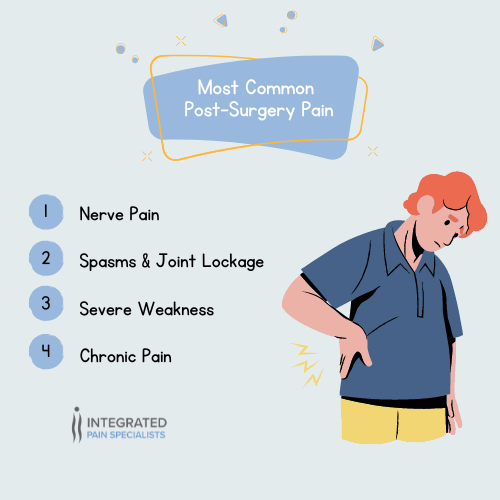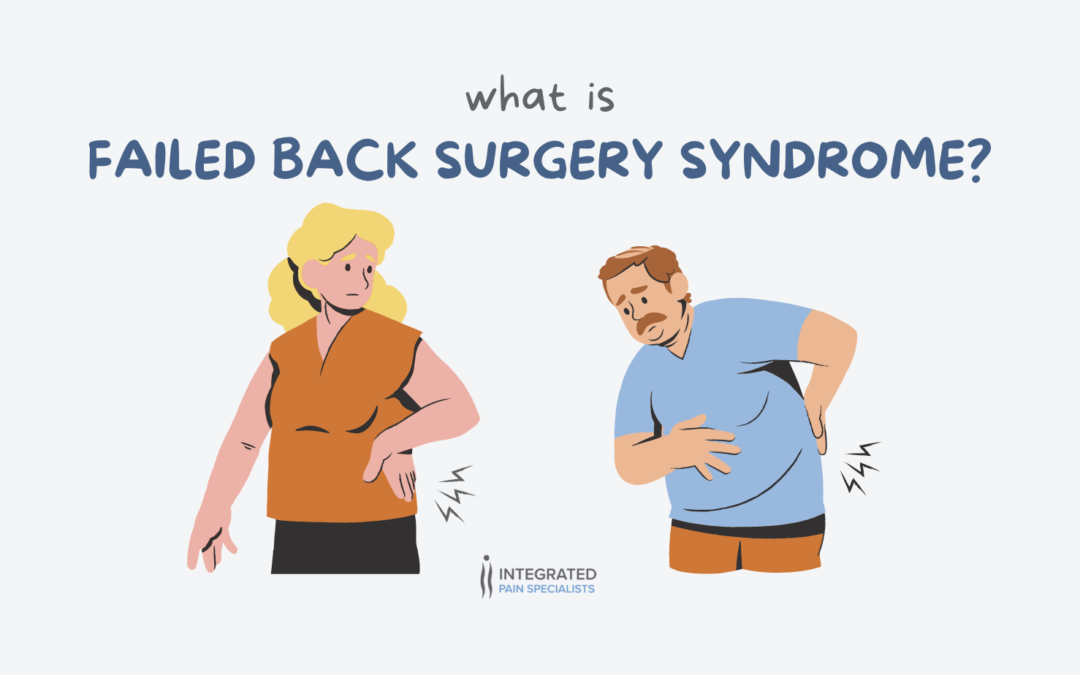To best understand what exactly failed back surgery syndrome is, or FBSS for short, it’s best described as a series of mixed post-op complications.
Post-op complications are possible after any type of surgery, but failed back surgery syndrome has made its own definition. With symptoms that can occur in some cases where the back surgery either doesn’t take, or post-op complications begin during the healing process.
Though there are many negative connotations around the term “failed back”, the syndrome is treatable at Integrated Pain Specialists. With the correct diagnosis and catching the symptoms early enough, we’ll help you treat FBSS before it grows worse.
Failed Back Surgery Syndrome Defined
FBSS is made up of a group of symptoms present after back, or spine surgeries. When the surgeries didn’t accomplish what they were intended to.
Because it is a syndrome, not a disease or illness, it’s best described as a set of symptoms. FBSS shows after a back surgery that even though the patient went through back surgery, their back is still having issues.
Other reasons could also be that the surgery created new symptoms, or that post-op complications may have caused the back to heal incorrectly. Which in turn, creates things like pain and other uncomfortable feelings.
As back surgery is a big procedure, with risks, recovery isn’t easy either. During recovery of back surgery, it’s normal to experience symptoms like cramps, swelling, bleeding, or pain. The body is doing it’s best to heal and recover. Though tender and can’t withstand a lot of movement, especially jerking motions.
Things like time, patience and painkillers are often used to get patients through recovery of back surgery and then get them to the stage of physical recovery.
When it comes to spine surgeries, they’re even more complex.
Spine surgeries have up to a 5% chance of having an unsuccessful result.
However, there are many different surgeries performed on a back and different pain that can be caused. With some surgeries far more complicated than others, they’re more likely to fault as they grow with complications.
Other times, alleviating the pain that comes with back surgery is possible, but not completely eliminating it.
When you understand what to expect after a back surgery and determine which signs are normal, you can help yourself understand and quickly not if you may be experiencing FBSS when it happens.
Post-Surgery Pain

When you go through surgery, post-op pain is almost inevitable. However, pain from surgery will normally lessen over time as the effects take hold. Relieving the back pain you were originally experiencing.
If the pain level you’re feeling stays the same for weeks, or the pain increases despite adamant recovery, it’s likely that something may be wrong. Either during, or after the procedure during recovery something may have happened to cause the pain.
It’s very important to track and pay attention to the levels of pain you’re experiencing and to get regularly checked during recovery. Especially if you’re experiencing more pain that before surgery.
Nerve Pain
After back surgery, all pain is usually nerve pain. But other forms of pain can point towards other things. Such as:
- Pinched Nerves
- Disc Herniation
- Failed Spinal Fusion
- Scar Tissue
All of these are symptoms of failed back surgery syndrome.
Scar tissue can appear around the surgical site and put pressure on nerves, or nerve roots. All the major nerves may have different symptoms, but another other common issue can be severe leg pain. Usually going down the side of the leg and increasing lower back pain.
Spasms & Joint Lockage
Other symptoms that could be considered bad signs are joint lockage and muscle spasms. These could both suggest surgery failure, or another issue created.
Experiencing muscle spasms, or cramps aren’t super uncommon right after surgery, but they should never be happening after you’ve recovered.
If you’re struggling to bend your legs, or get sudden feelings of spasm and cramps, you should immediately contact a professional. Especially if it’s affecting your walking.
Severe Weakness
A nerve’s job is to send signals to the body directly from the brain. Something called lumbar disc herniation can leave patients with partial paralysis, or immobility in the limbs. This is called limb paresis.
The surgery to reconnect this disc herniation is supposed to relieve patients of those symptoms and help them regain control of their limbs.
A patient’s full recovery is never guaranteed. Things such as muscle weakness continuing, or even increasing after surgery as well as partial paralysis are all signs of possible failed back surgery syndrome.
Chronic Pain
Usually, finding relief for their chronic pain is one of the main reasons someone will seek back surgery.
If their surgery doesn’t aid them in that back pain relief, or causes new chronic pain, those are also possible signs of FBSS.
Treating FBSS
When it comes to the treatment of failed back surgery syndrome, there are a few options. Doctors will usually urge patients to give the surgery another shot. Research suggests that a reoperation is not really the best course of treatment.
Going back to perform the same procedure on someone experiencing FBSS will usually not show to be effective. It’s smarter to try and utilize different routes of treatment that are much less invasive.
This could include physical therapy, exercise, or special treatment programs like our natural therapies at Integrated Pain Specialists.
Common Treatments
Another common form of treatment for FBSS is medication. This is definitely not a reliable form of long-term treatment. Maybe it’s effective for short-term treatment and pain management, but over time it’s only covering up the issues at hand.
In some cases where a patient is approached with no other options for treatment, or pain relief they’ll be suggested an intrathecal pump installation. This pump is designed to administer a measured dose of narcotics straight into the fluid near the spinal cord.
This will greatly reduce pain and effectively manage it for patient’s struggling with chronic pain and no other treatments at the moment.
Ultimately, the treatment will depend on each patient and what is causing their failed back surgery syndrome.
If their symptoms show up after surgery, there could be a number of possible issues or complications that might lead to chronic pain in their back, or spine after a major back operation.
One of the most common causes is known as aberrant fusion of the vertebrae, also known as failed vertebrae fusion. Another one is recurrent disc herniation. This is from lack of decompression on the spine, pain from scar tissue and a patient’s lack of rehabilitation after surgery.
Nerve, or back pain may also reoccur if the surgery didn’t address the patient’s main cause of pain. Maybe the procedure involved had a higher risk of failure than others. There could be a lot of factors involved.
Treating Failed Back Surgery Syndrome at Integrated Pain Specialists
For those who have had back surgery, and are experiencing symptoms brought on by the unsuccessful surgery, Integrated Pain Specialists offers treatment that can help.
In a state of the art facility, using the most current diagnostic tools to assess and determine the root cause of each patient’s condition, the doctors at Integrated Pain Specialists customize treatment plans for the individual patient’s health concern.
In order to help with chronic pain management, while working to help the body to heal, Integrated Pain Specialists uses treatments like physical therapy, chiropractic, massage therapy, gentle stretching, and simple exercise.
With natural therapies and an integrated approach to healthcare, Integrated Pain Specialists helps each patient achieve optimal wellness. Contact us to begin your journey to help find wellness.

